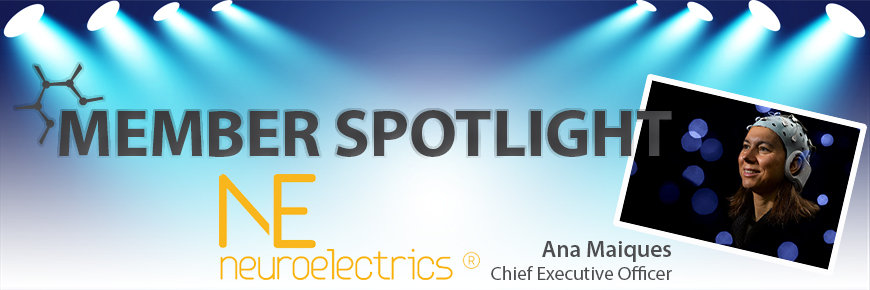
Every month, MassBio spotlights a member company and the great work they’re doing to advance the life sciences industry and support the patients we serve. This month we spoke with Ana Maiques, CEO of Neuroelectrics, a company aiming to change the way we interact with the brain.
Tell us about your organization and your current initiatives, along with what you’re focused on in the coming year?
Neuroelectrics develops proprietary medical products to diagnose, treat brain disorders, and improve overall brain health. The company’s lead product is Starstim™, a non-invasive neuromodulation system which allows brain region targeting at a level comparable to implanted devices. The company also has proprietary computer models and machine learning capabilities for precise and personalized therapies for diagnosing and treating brain diseases.
Our current initiatives include a therapeutic treatment of Dementia. We are working on a 40-patient study at the Harvard Institute of Aging (at Harvard Medical School) to evaluate the use of Starstim™ to improve cognition, gait and balance in seniors with symptoms of dementia. Preventable medical costs due to falls is a major issue with this patient population. It is expected this study will lead to a follow-on study for FDA approval.
We are also involved in the pre-symptomatic detection of Parkinson’s Disease with the Michael J. Fox Foundation. They have funded a 750-patient, three-year study on combining EEG with machine learning to develop biomarkers for Parkinson’s disease, based on strong results from a previous 118 patient study that was able to identify Parkinson’s in patients with sleep disorders five years or more before symptoms were present.
Lastly, we have a clinical trial for the therapeutic treatment of drug resistant Epilepsy. Neuroelectrics is sponsoring a clinical trial under an open FDA IDE for approval of its Starstim™ product to treat Epilepsy not well controlled with medications. One-third of the 50 million patients with Epilepsy do not respond to drugs. Patients are currently being enrolled in the first study phase at Boston Children’s Hospital and Beth-Israel Deaconess Medical Center in Boston. A follow-up pivotal study of ~90 patients is needed for an FDA approval which we expect to be completed by the end of 2019.
How does your organization’s activities help patients now and into the future?
The treatment of brain disease is a US$165B market, but with significant gaps in diagnosis, prevention, and treatment. Neuroelectrics has the only platform that combines proprietary hardware for precisely stimulating and measuring the brain, a cloud-based system for monitoring and personalizing treatment, and a machine-learning platform based on proprietary physics-based models of the brain. We believe this gives us a protectable competitive advantage, as (1) we expect to be first to market with an FDA-approved tDCS* therapeutic device, (2) we have a significant lead in our long-term goal of developing products suitable for use at home.
What do you see as the biggest challenge facing the life sciences industry today?
I think the life sciences industry has to start to break silos between drug companies, medical devices and digital health. To me, the industry has to start shifting toward what the patient needs which will probably be a combination of different therapeutic modalities.
I would love to see more interaction between the different players toward achieving personalized new therapies for patients that involve different modalities.
Technology is changing the life sciences industry, new players like Amazon, and Google are going to enter the healthcare industry. They will bring with them their data sets which can help to effect positive change if we can leverage the information constructively.
In conclusion, we need to work in different ways and at different speeds.
What worked on the past may not work in the future and real collaboration between the different treatments is going to change the way we provide healthcare with the support of digital technologies.
If you’re interested in being featured in MassBio’s Member Spotlight, please see guidelines here.